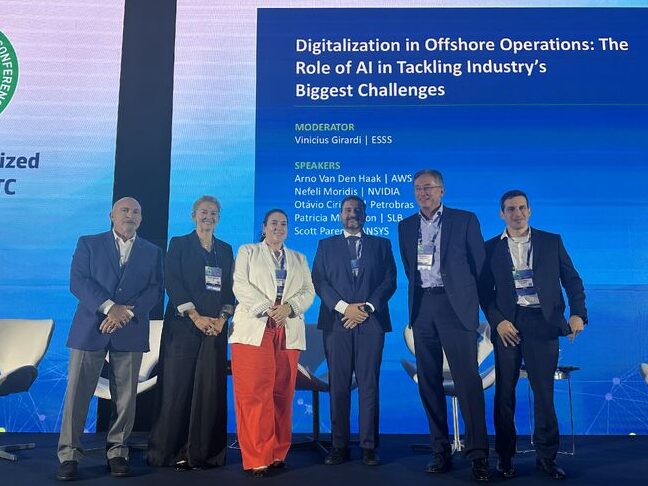As world leaders prepared to descend on the small city of Belém in the Brazilian Amazon for the COP30 climate summit, artificial intelligence (AI) chip-manufacturer Nvidia was instead peddling its energy-guzzling AI tools to Brazilian oil and gas companies, DeSmog can reveal.
During the Offshore Technology Conference (OTC) in Rio de Janeiro last week, a gathering of over 23,000 oil and gas representatives, Nvidia sent a senior energy staffer to sell bespoke AI software to help oil giants dredge up ever-vaster troves of fossil fuels. Nvidia did so even though the tech giant markets itself as a creator of AI-driven climate crisis solutions, and has made the (contested) claim that 100 percent of its prodigious electricity consumption comes from renewable sources.
The company’s Global Head of Subsurface Energy Solutions, Nefeli Moridis, who is on the board of the Society of Petroleum Engineers International, joined an OTC Conference panel on 29 October which discussed how to use AI to tackle the “biggest challenges” in offshore oil and gas operations – including “optimizing production.”

Credit: OTC Brasil / Linkedin
The panel also featured representatives from the tech giant Amazon Web Services (AWS), who talked about “why Brazil is uniquely positioned to lead the global offshore AI transformation”, alongside a senior figure from one of the conference’s “master sponsors” – Brazilian state-owned oil and gas company Petrobras.
Petrobras, which has already garnered criticism for accelerating its exploration of new oil and gas reserves ahead of COP30, was granted a new license in late October from the Brazilian government (also a master sponsor) to drill on the Amazon coast.
“What a great discussion! Robotics can – and will – be leveraged in offshore environments to push the boundaries of what’s possible,” Moridis promised on social media platform LinkedIn after speaking on the panel.

Speakers included Otávio Ciriblli from Petrobras (far-right); Nefeli Moridis from Nvidia (third from left); Arno Van Den Haak, Amazon Web Services (second from right).
Credit: OTC Brasil / Linkedin
Nvidia’s decision to flog its technology to fossil fuel firms at the OTC Conference was not a one-off. The tech giant, which was recently crowned the world’s largest public company and donated $1 million to Donald Trump’s inauguration ceremony, has a long history of selling its wares to oil and gas companies.
On the “oil and gas operations powered by AI” page of its website, Nvidia celebrates its recent work developing an AI assistant for Saudi Aramco, a custom AI chatbot with expertise about chemicals for Shell, and an AI tool for Petrobras to “speedup… reservoir simulations”.
The contradiction between Nvidia’s climate claims and its courtship to oil and gas giants, particularly in the shadow of the upcoming COP30 negotiations, has sparked outrage among campaigners.
“This kind of hypocrisy undermines the credibility of tech companies heading into COP – they can’t present themselves as climate leaders while marketing AI to expand fossil fuel production,” said Holly Alpine, a former Microsoft employee turned campaigner for Enabled Emissions, which fights to stop big tech from enabling fossil fuel industry expansion.
Tech companies have been selling their services to the fossil fuel industry for a long time. A 2023 survey by consulting firm EY reported that 92 percent of fossil fuel companies are already using AI for their operations.
Nvidia’s Climate Contradictions
It is still unclear whether Nvidia will be attending COP30 – especially given the company’s increasing closeness to the administration of U.S. President Donald Trump, which has reversed American climate policy so dramatically that some experts are now calling the U.S. a “petrostate”.
The Trump administration has pulled out of attending COP in Brazil this year.
Nvidia, regardless of the company’s closeness to Trump, continues to trumpet its climate credentials.
Just a month ago at New York Climate Week, the world’s largest discussion of climate crisis solutions outside COP, Nvidia’s Head of Sustainability Joshua Parker spoke on a panel that celebrated the company’s “innovative climate technologies”, which Parker argued will “advance sustainability solutions at an unprecedented pace”.
The company has previously boasted that its products make “every day about Earth Day” by monitoring wildfires and extreme weather, on top of the energy efficiency of its chips.
Nvidia also had a presence at past COP summits. At COP29 in Baku, Azerbaijan, Nvidia sent its senior sustainability leader to sell the idea that “AI has the potential to make other sectors much more energy efficient”.
The previous year, at COP28 in Dubai, United Arab Emirates, Nvidia joined up with the Commonwealth Secretariat for a panel about using AI to support climate action in nations vulnerable to climate change, including to track sea level rise in countries like Tonga.
Its climate pledges are not without controversy. Nvidia’s claim that 100 percent of its electricity consumption in 2025 is powered by renewable energy was challenged by a report from Greenpeace in October that ranked Nvidia last among tech giants on the decarbonisation of its supply chain.
The Greenpeace report said that Nvidia relies on suppliers that use fossil fuels to power their operations, and criticised the company for failing to release data on how much electricity those suppliers use. In the 2025 fiscal year, Nvidia suppliers produced 6 million tonnes of CO2, according to Greenpeace – double what they produced just two years earlier.
Alpine goes further. “A company cannot claim to lead on climate while its technology drives the very emissions it vows to eliminate – or claim transparency while concealing those risks from shareholders,” she told DeSmog.
Nvidia was approached for comment.
Beyond Nvidia
This phenomenon goes well beyond Nvidia and COP30.
AWS and Microsoft, which fielded two of the OTC Conference’s AI panel speakers (the Microsoft representative did not ultimately attend), reportedly make vast sums from the fossil fuel industry.
A 2024 report by the group Amazon Employees for Climate Justice goes so far as to claim that by this year, AWS “could be making $9.6 billion annually from the oil and gas industry alone – about 10 percent of AWS revenue.”
Amazon is not hiding its work with these companies. In response to DeSmog, Amazon stated: “The energy industry should have access to the same technologies as other industries. We will continue to provide cloud services to companies in the energy industry to make their legacy businesses less carbon intensive and help them accelerate development of renewable energy businesses.”
As for Microsoft, documents viewed by The Atlantic last year suggest that oil and gas revenues may account for a market opportunity of $35 billion to $75 billion each year for the firm. Alpine told the Financial Times this may constitute up to half of the company’s cloud revenue.
Alpine’s campaign group, Enabled Emissions, argues that tech companies selling AI for fossil fuel expansion are causing “staggering emissions” by enabling increased oil and gas drilling with their software.
“AI isn’t neutral – it’s shaping the pace and scale of fossil fuel expansion,” Alpine told DeSmog.
Subscribe to our newsletter
Stay up to date with DeSmog news and alerts
AI at COP30
As the energy-intensity of the AI boom skyrockets, and big tech firms water down or even completely rescind their climate commitments, they are also reportedly shrinking from visibility at climate events.
Last year, the Financial Times reported that big tech firms had already begun stepping back from participation at COP29 compared to previous years.
On 28 October, Microsoft’s founder Bill Gates, a philanthropist worth an estimated $118 billion, wrote a memo addressed to COP30 attendees saying climate change won’t cause “humanity’s demise.”
Gates’s arguments in the memo have drawn outcries of dismay from some of the world’s top climate scientists, who have pointed out that “this memo is already being championed by those seeking to misinform and sow doubt about climate change and delay climate progress – up to and including the executive branch of the United States government.”
Whether big tech firms attend or not, COP30 is expected to involve discussions of the threats to climate change posed by the immense amounts of energy needed to fuel the global AI energy boom, as well as efforts to address the climate crisis using AI – an effort critics say is misguided.
“The fact is that the climate crisis is not primarily a technological problem: we have most if not all of the tech we need to fix it,” Adam Becker, science journalist and author, previously told DeSmog.
“Tech oligarchs think that they can burn fossil fuels with impunity and clean it up later with a magic wand given to them by a machine god. But that isn’t going to happen. The reality is that we need to save ourselves from the machinations of these cruelly myopic billionaires.”
Subscribe to our newsletter
Stay up to date with DeSmog news and alerts






